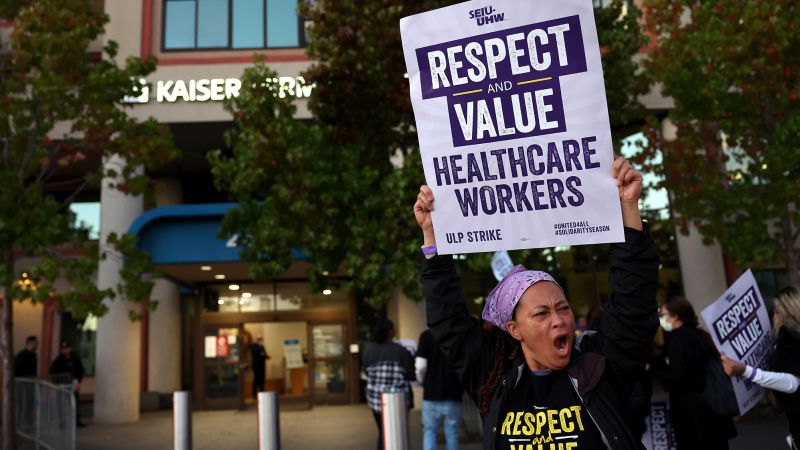CNN: The Largest Healthcare Strike in US History Continues as 75,000 Kaiser Permanente Workers Walk Off the Job
In what is now the second day of the largest healthcare strike in US history, over 75,000 Kaiser Permanente workers have gone on strike. These employees, who are based in California, Colorado, Washington, and Oregon, are represented by a coalition of unions that make up 40% of Kaiser Permanente’s staff. Additionally, nearly 200 workers from Kaiser facilities in Virginia and Washington, DC, joined the picket lines for a day. While the work stoppage is scheduled to end early Saturday morning, the coalition has stated that if a new employment contract is not negotiated by then, they are planning a longer strike in November.
Hilary Costa, a spokesperson for Kaiser Permanente, stated on Wednesday that negotiations between the coalition and Kaiser did not result in a settlement. However, “a number of tentative agreements in bargaining” were reached. Kaiser also agreed to across-the-board wage increases for the first time in bargaining. Nevertheless, the union coalition, represented by Caroline Lucas, is eagerly waiting for a meaningful response from Kaiser regarding their key priorities, which include safe staffing, protections against outsourcing for current healthcare workers, and fair wages to reduce turnover.
The union coalition is demanding higher pay and other benefits, as well as a strategy to address the chronic staff shortage that has left workers overworked and burnt out, especially in the aftermath of the pandemic. Workers from various roles, such as nursing staff, dietary workers, receptionists, lab technicians, and pharmacists, are participating in the strike. Many of these workers, like Ju-Anna Isaiah, a ward clerk transcriber in Los Angeles, are experiencing a lack of new hires, resulting in overwhelming workloads. Isaiah shared that the lack of staff has led to delays in patients’ recovery and an overall difficult situation for frontline healthcare workers.
The concerns raised by Isaiah are shared by other Kaiser workers on the picket line. The union has deemed current staffing levels at Kaiser as “unsafe” and patient wait times as “dangerous.” James Bell, a radiology technologist, mentioned incidents where patients got out of bed after waiting too long for assistance from the limited staff on duty, leading to falls.
In response, Kaiser Permanente acknowledges labor shortages as an industry-wide problem but emphasized that they are working aggressively to hire more staff. The company has already hired 10,086 people in union-represented jobs this year. However, workers argue that better pay and benefits would help Kaiser attract more staff effectively.
As negotiations took place before the strike, some progress was made, but no agreement has been reached regarding wage increases. Currently, Kaiser Permanente has offered a 5% wage increase for the first three years of the new contract and a 4% increase in the final year. The coalition, however, is requesting a 6.5% increase in the first two years and a 5.75% increase in the final two years. Another sticking point is the minimum pay for unionized employees, with the coalition demanding an increase from $21 per hour in 2024 to $23 per hour.
Rocio Chacon, a striking Kaiser worker who is part of the union’s negotiating committee, highlighted the financial struggles faced by employees due to the rising cost of living. Some workers are even forced to sleep in their cars because they can’t afford to live near their place of work. In response, Kaiser Permanente asserts its position as a leader in pay, claiming that their proposals in bargaining would ensure that they maintain that position.
This unprecedented strike occurs during a period of heightened labor activity across the United States. Tens of thousands of workers from various industries are demanding better pay and benefits. Healthcare workers, in particular, have been advocating for safer and more secure work environments. This is the first-ever national strike effort at Kaiser Permanente.
Denial of responsibility! Vigour Times is an automatic aggregator of Global media. In each content, the hyperlink to the primary source is specified. All trademarks belong to their rightful owners, and all materials to their authors. For any complaint, please reach us at – [email protected]. We will take necessary action within 24 hours.


